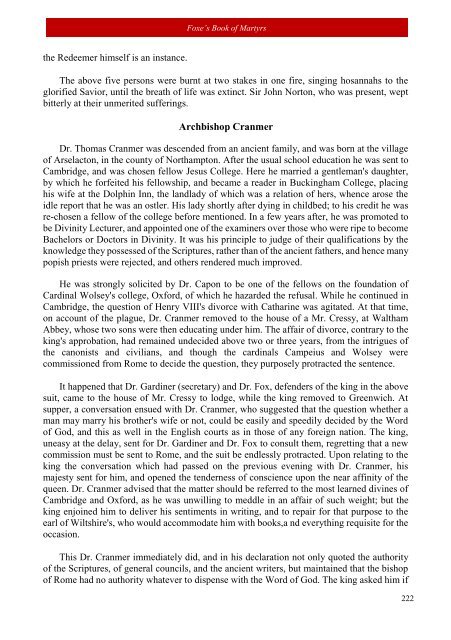Foxe - The Book of Martyrs
The mystery of history is not completely dark, since it is a veil which only partially conceals the creative activity and spiritual forces and the operation of spiritual laws. It is commonplace to say that the blood of the martyrs is the seed of the Church yet what we are asserting is simply that individual acts of spiritual decision bear social fruit …For the great cultural changes and historic revolutions that decide the fate of nations or the character of an age is the cumulative result of a number of spiritual decisions … the faith and insight, or the refusal and blindness, of individuals. No one can put his finger on the ultimate spiritual act that tilts the balance, and makes the external order of society assume a new form… Persecution, powerless to destroy or even to shake this new community, made it only the more sensible of its own strength, and pressed it into a more compact body.
The mystery of history is not completely dark, since it is a veil which only partially conceals the creative activity and spiritual forces and the operation of spiritual laws. It is commonplace to say that the blood of the martyrs is the seed of the Church yet what we are asserting is simply that individual acts of spiritual decision bear social fruit …For the great cultural changes and historic revolutions that decide the fate of nations or the character of an age is the cumulative result of a number of spiritual decisions … the faith and insight, or the refusal and blindness, of individuals. No one can put his finger on the ultimate spiritual act that tilts the balance, and makes the external order of society assume a new form… Persecution, powerless to destroy or even to shake this new community, made it only the more sensible of its own strength, and pressed it into a more compact body.
Create successful ePaper yourself
Turn your PDF publications into a flip-book with our unique Google optimized e-Paper software.
<strong>Foxe</strong>’s <strong>Book</strong> <strong>of</strong> <strong>Martyrs</strong><br />
the Redeemer himself is an instance.<br />
<strong>The</strong> above five persons were burnt at two stakes in one fire, singing hosannahs to the<br />
glorified Savior, until the breath <strong>of</strong> life was extinct. Sir John Norton, who was present, wept<br />
bitterly at their unmerited sufferings.<br />
Archbishop Cranmer<br />
Dr. Thomas Cranmer was descended from an ancient family, and was born at the village<br />
<strong>of</strong> Arselacton, in the county <strong>of</strong> Northampton. After the usual school education he was sent to<br />
Cambridge, and was chosen fellow Jesus College. Here he married a gentleman's daughter,<br />
by which he forfeited his fellowship, and became a reader in Buckingham College, placing<br />
his wife at the Dolphin Inn, the landlady <strong>of</strong> which was a relation <strong>of</strong> hers, whence arose the<br />
idle report that he was an ostler. His lady shortly after dying in childbed; to his credit he was<br />
re-chosen a fellow <strong>of</strong> the college before mentioned. In a few years after, he was promoted to<br />
be Divinity Lecturer, and appointed one <strong>of</strong> the examiners over those who were ripe to become<br />
Bachelors or Doctors in Divinity. It was his principle to judge <strong>of</strong> their qualifications by the<br />
knowledge they possessed <strong>of</strong> the Scriptures, rather than <strong>of</strong> the ancient fathers, and hence many<br />
popish priests were rejected, and others rendered much improved.<br />
He was strongly solicited by Dr. Capon to be one <strong>of</strong> the fellows on the foundation <strong>of</strong><br />
Cardinal Wolsey's college, Oxford, <strong>of</strong> which he hazarded the refusal. While he continued in<br />
Cambridge, the question <strong>of</strong> Henry VIII's divorce with Catharine was agitated. At that time,<br />
on account <strong>of</strong> the plague, Dr. Cranmer removed to the house <strong>of</strong> a Mr. Cressy, at Waltham<br />
Abbey, whose two sons were then educating under him. <strong>The</strong> affair <strong>of</strong> divorce, contrary to the<br />
king's approbation, had remained undecided above two or three years, from the intrigues <strong>of</strong><br />
the canonists and civilians, and though the cardinals Campeius and Wolsey were<br />
commissioned from Rome to decide the question, they purposely protracted the sentence.<br />
It happened that Dr. Gardiner (secretary) and Dr. Fox, defenders <strong>of</strong> the king in the above<br />
suit, came to the house <strong>of</strong> Mr. Cressy to lodge, while the king removed to Greenwich. At<br />
supper, a conversation ensued with Dr. Cranmer, who suggested that the question whether a<br />
man may marry his brother's wife or not, could be easily and speedily decided by the Word<br />
<strong>of</strong> God, and this as well in the English courts as in those <strong>of</strong> any foreign nation. <strong>The</strong> king,<br />
uneasy at the delay, sent for Dr. Gardiner and Dr. Fox to consult them, regretting that a new<br />
commission must be sent to Rome, and the suit be endlessly protracted. Upon relating to the<br />
king the conversation which had passed on the previous evening with Dr. Cranmer, his<br />
majesty sent for him, and opened the tenderness <strong>of</strong> conscience upon the near affinity <strong>of</strong> the<br />
queen. Dr. Cranmer advised that the matter should be referred to the most learned divines <strong>of</strong><br />
Cambridge and Oxford, as he was unwilling to meddle in an affair <strong>of</strong> such weight; but the<br />
king enjoined him to deliver his sentiments in writing, and to repair for that purpose to the<br />
earl <strong>of</strong> Wiltshire's, who would accommodate him with books,a nd everything requisite for the<br />
occasion.<br />
This Dr. Cranmer immediately did, and in his declaration not only quoted the authority<br />
<strong>of</strong> the Scriptures, <strong>of</strong> general councils, and the ancient writers, but maintained that the bishop<br />
<strong>of</strong> Rome had no authority whatever to dispense with the Word <strong>of</strong> God. <strong>The</strong> king asked him if<br />
222


















